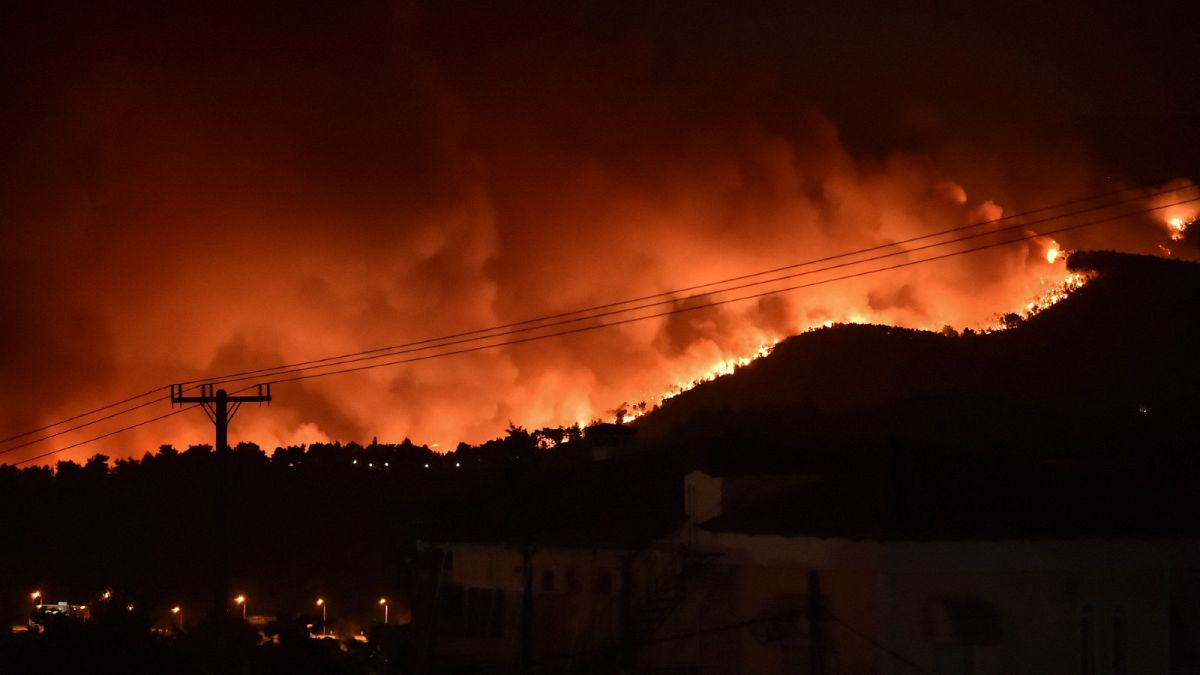"Several days of heatwave have turned the whole country into a powder keg," said Greece's PM.
At least one person has died in Greece as wildfires continue to spread, forcing thousands to flee in Greece and Turkey.
A 38-year-old man in northern Athens died after being hit by a falling utility pole, the Greek health ministry said.
In neighbouring Turkey, wildfires described as the worst in decades have swept through parts of the southern coast for the past 10 days, killing eight people. At least 36,000 people were evacuated to safety in Mugla province alone, officials said.
Firefighters in Greece waged an overnight battle to stop the flames north of the capital city Athens from reaching populated areas, electricity installations and historic sites.
The massive blaze, now on its fourth day, has devastated 20 kilometres of forest area, destroyed several houses and shrouded Athens in the acrid smell and smoke of the fire.
Further north, on the island of Evia, the coastguard mounted a major operation to evacuate hundreds of people by sea, using patrol boats, fishing and private vessels to rescue residents and holidaymakers from the approaching flames.
“We're talking about the apocalypse, I don't know how to describe it,” Sotiris Danikas, head of the coastguard in the town of Aidipsos on Evia, told state broadcaster ERT, describing the sea evacuation
Meanwhile, dozens of other villages and neighbourhoods were emptied in the southern Peloponnese region.
Traffic was halted on the country's main highway connecting Athens to northern Greece, as crews tried to use the road as a barrier to stop the flames advancing before water-dropping planes resumed flights at first light. But sparks and burning pine cones carried the fire across the highway at several points.
In total, nearly 60 villages and settlements were evacuated on Thursday and early Friday across southern Greece, with weather conditions expected to worsen as strong winds were predicted in much of the country.
Greek Prime Minister Kyriakos Mitsotakis said on Thursday evening that the country was facing "unprecedented conditions as several days of heatwave have turned the whole country into a powder keg".
According to Deputy Civil Protection Minister Nikos Hardalias, 57 of the 99 fires counted on Thursday were still active in the evening, especially on the island of Evia and in the Peloponnese, in the west and east of the country, where the situation remained worrying on Friday morning.
Copernicus, the EU's earth observation programme, said that despite a slight improvement, the fire forecast in the Balkans and southern Italy remained "worrisome" as well.
Europe has been sending help to Greece to tackle the wildfires.
Firefighters from France arrived in Greece on Thursday evening to assist in battling the wildfires near Athens.
Two more firefighting planes from France were also expected to be dispatched, as well as reinforcements from Sweden, Austria and Bulgaria.
Israel will send 15 firefighters and a large shipment of fire retardants in a civilian plane as soon as possible, the Israeli authorities said.
